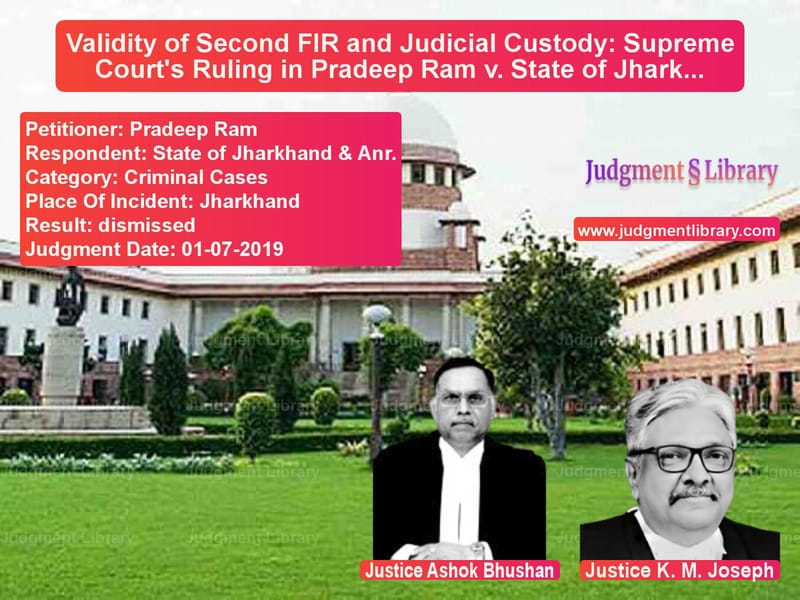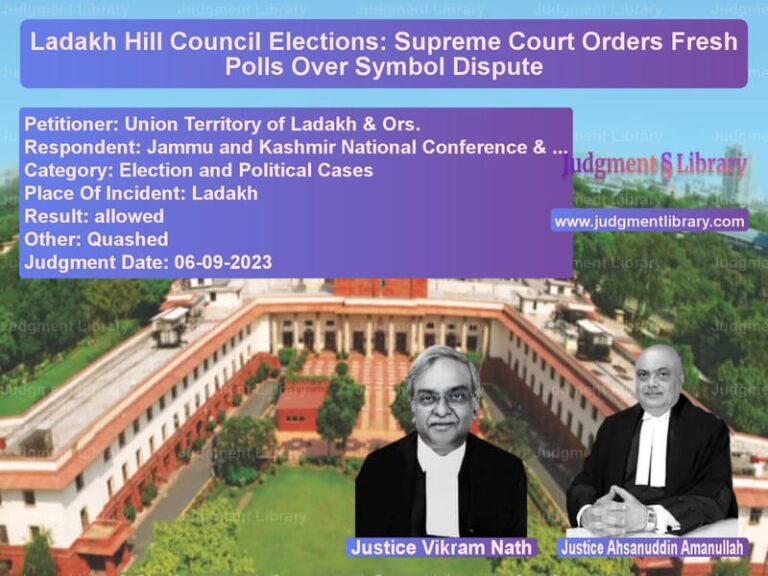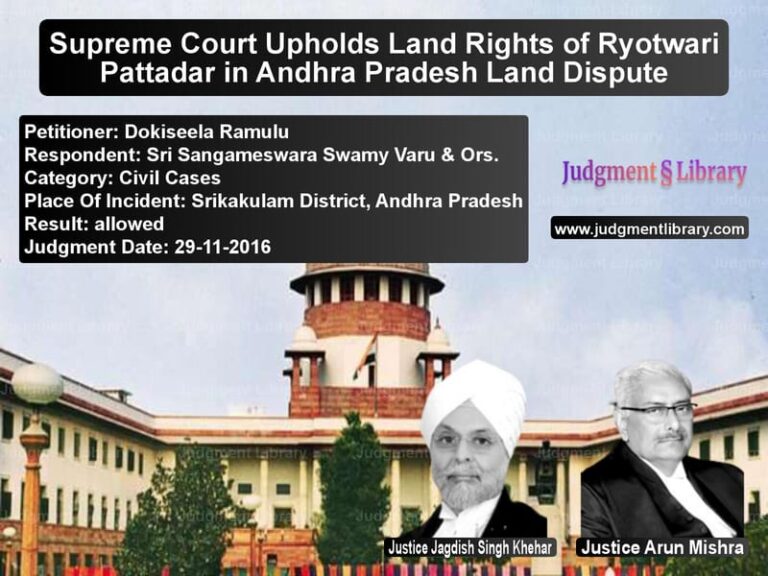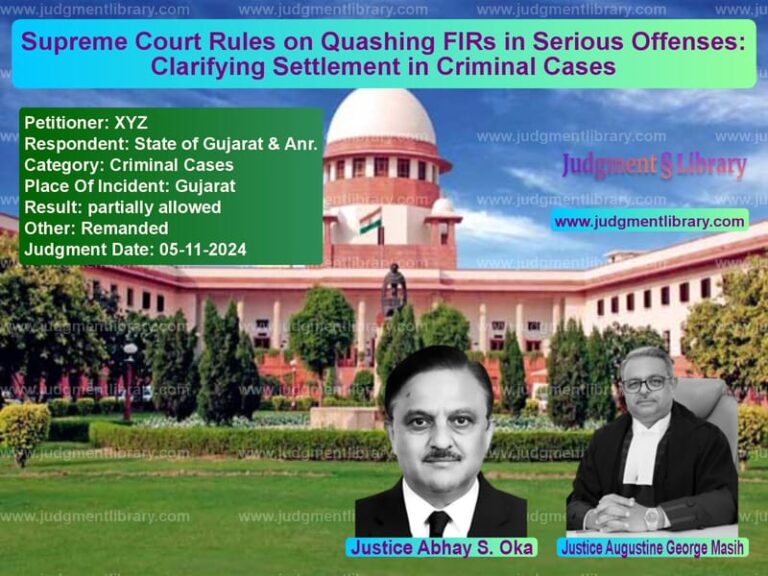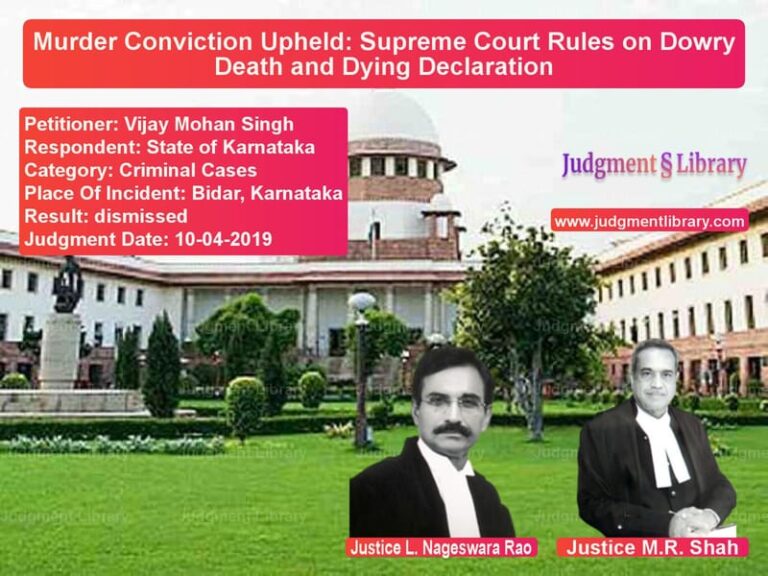Validity of Second FIR and Judicial Custody: Supreme Court’s Ruling in Pradeep Ram v. State of Jharkhand
The Supreme Court of India recently delivered a landmark judgment in Pradeep Ram v. State of Jharkhand, addressing crucial legal issues concerning the validity of a second First Information Report (FIR), judicial custody, and the applicability of Sections 167 and 309 of the Criminal Procedure Code (CrPC). This case involved serious charges under the Unlawful Activities (Prevention) Act, 1967 (UAPA), and other criminal laws.
Background of the Case
The case began with an FIR registered on January 11, 2016 (FIR No. 02/2016), at Tandwa Police Station, Jharkhand. The charges against the accused, Pradeep Ram, included offenses under Sections 414, 384, 386, 387, and 120-B of the Indian Penal Code (IPC), along with Sections 25(1-B)(a), 26, and 35 of the Arms Act, and Section 17(1) and (2) of the Criminal Law Amendment Act. The allegations centered on the accused extorting money by threatening contractors and coal traders using the name of a banned extremist group.
During a search of the appellant’s house, the police recovered Rs. 57,57,510 and multiple mobile phones, for which he could not provide a satisfactory explanation. The appellant was taken into custody, but he was granted bail by the High Court on March 10, 2016.
Key Legal Developments
- On April 9, 2017, the investigating officer added new charges under Sections 16, 17, 20, and 23 of the UAPA.
- On February 13, 2018, the Central Government transferred the investigation to the National Investigation Agency (NIA) under the NIA Act, 2008.
- On February 16, 2018, the NIA re-registered the case as FIR No. RC-06/2018/NIA/DLI.
- The NIA sought a production warrant for the accused, who was in custody in another case, and he was remanded to judicial custody on June 25, 2018.
Legal Issues Before the Supreme Court
The appellant filed a writ petition before the Jharkhand High Court challenging the second FIR and his judicial custody under Section 167 CrPC. After the High Court dismissed the petition, he approached the Supreme Court, raising the following issues:
- Can an accused who has been granted bail be re-arrested without cancellation of the previous bail when new charges are added?
- Does the re-registration of the case by the NIA constitute a second FIR, which is not legally permissible?
- Can the NIA conduct further investigation and file a supplementary charge sheet when the original investigation has been completed?
- Was the Special Judge correct in remanding the appellant to judicial custody under Section 167 CrPC?
Arguments by the Petitioner (Pradeep Ram)
The appellant’s counsel contended:
- Once bail has been granted, the accused cannot be taken into custody unless the bail is canceled.
- The re-registration of the FIR by the NIA constituted an impermissible second FIR for the same offense.
- Since cognizance had already been taken in the original case, the NIA could not conduct further investigation and had to rely on the original charge sheet.
- Remanding the accused under Section 167 CrPC was incorrect, as the case had moved beyond the investigation stage and Section 309 CrPC should have been applied.
Arguments by the Respondents (State of Jharkhand & NIA)
The Additional Solicitor General, representing the State and the NIA, argued:
- The NIA did not register a new FIR but only re-registered the existing case as required under the NIA Act.
- The agency was legally empowered to conduct further investigation under Section 173(8) CrPC, even after filing of the charge sheet.
- Since new and more serious offenses under UAPA were added, the previous bail did not apply, and the accused had to apply for fresh bail.
- Under Section 167 CrPC, the Special Judge had jurisdiction to remand the accused to custody for further investigation.
Supreme Court’s Judgment
The Supreme Court, in a detailed judgment authored by Justice Ashok Bhushan, upheld the State’s and NIA’s arguments and made the following key rulings:
On the Issue of Second FIR
The Court held:
“The re-registration of the case by the NIA does not amount to a second FIR. It is merely a procedural step to ensure compliance with the NIA Act.”
The Court cited precedents such as T.T. Antony v. State of Kerala and Amitbhai Anilchandra Shah v. CBI, reiterating that a second FIR for the same offense is not allowed, but in this case, the NIA was legally authorized to take over and continue the investigation.
On the Issue of Further Investigation
The Court ruled:
“Under Section 173(8) CrPC, even after a charge sheet is filed, the police (or NIA) can conduct further investigation and file a supplementary charge sheet.”
It emphasized that the addition of UAPA offenses justified the NIA’s continued investigation.
On the Issue of Judicial Custody
The Court clarified:
“The Special Judge was correct in remanding the accused under Section 167 CrPC. When new offenses are added, fresh custody orders can be issued even if an earlier charge sheet had been filed.”
The Court, however, corrected the High Court’s interpretation, stating that the remand should have been under Section 309 CrPC rather than Section 167, as cognizance had already been taken in the case.
Key Takeaways
- Re-registration of an FIR by the NIA is not a second FIR: It is a procedural necessity under the NIA Act.
- Further investigation after a charge sheet is allowed: Authorities can collect additional evidence and file supplementary reports under Section 173(8) CrPC.
- Bail for earlier offenses does not cover newly added serious charges: The accused must apply for fresh bail.
- Remand orders must be correctly classified: If cognizance has been taken, remand should be under Section 309 CrPC, not Section 167.
Conclusion
The Supreme Court’s decision in this case sets an important precedent on investigative powers, judicial custody, and bail conditions in cases involving new and serious offenses. The ruling balances the rights of the accused with the necessity of national security investigations, ensuring that legal procedures are correctly followed.
Petitioner Name: Pradeep Ram.Respondent Name: State of Jharkhand & Anr..Judgment By: Justice Ashok Bhushan, Justice K. M. Joseph.Place Of Incident: Jharkhand.Judgment Date: 01-07-2019.
Don’t miss out on the full details! Download the complete judgment in PDF format below and gain valuable insights instantly!
Download Judgment: Pradeep Ram vs State of Jharkhand & Supreme Court of India Judgment Dated 01-07-2019.pdf
Direct Downlaod Judgment: Direct downlaod this Judgment
See all petitions in Bail and Anticipatory Bail
See all petitions in Money Laundering Cases
See all petitions in Terrorist Activities
See all petitions in Fraud and Forgery
See all petitions in Custodial Deaths and Police Misconduct
See all petitions in Judgment by Ashok Bhushan
See all petitions in Judgment by K.M. Joseph
See all petitions in dismissed
See all petitions in supreme court of India judgments July 2019
See all petitions in 2019 judgments
See all posts in Criminal Cases Category
See all allowed petitions in Criminal Cases Category
See all Dismissed petitions in Criminal Cases Category
See all partially allowed petitions in Criminal Cases Category

